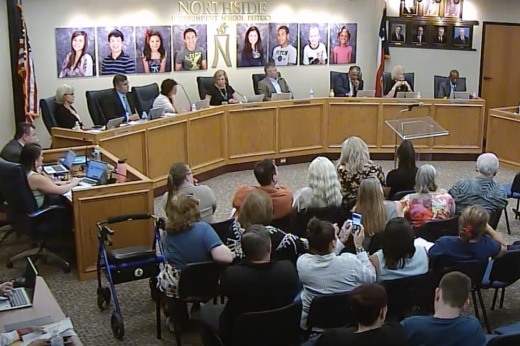The Northside ISD board on Aug. 23 adopted a $985.6 million budget for the 2022-23 academic year with a $61.6 million deficit.
NISD officials said they are projecting $923.9 million in general fund revenue this new school year, a decrease from the $941.1 million in revenue that NISD expected to generate in 2021-22.
NISD projected $985.6 million in general fund expenditures in 2022-23, up from $975.8 million last school year. District officials said 84% of this year’s general fund spending will be directed to teachers and aides, campus leadership, and student support.
The latter budget figure, NISD officials said, includes a $19.5 million increase in employee compensation and $24 million set aside to accommodate districtwide growth and improvement, such as the opening of Sotomayor High School, a new campus.
The result is a $61.6 million general fund deficit, NISD officials said, adding NISD operated with a $34.6 million deficit last year.
NISD officials said despite NISD being one of Texas’s biggest public school systems, the district and others are struggling with challenges, such as state-mandated limits on property tax rates and some students enrolling in a neighboring district or pursuing another schooling option.
NISD officials formed a new budget around an assumed average daily attendance number of 93,000, slightly lower than the 99,873 number that the district averaged during the 2021-22 school year.
NISD is also lowering its total property tax rate from $1.2613 per $100 taxable valuation to $1.1901.
During a June board presentation on the 2022-2023 budget, NISD Superintendent Brian Woods said nobody should think NISD is awash with money given a rising population, increasing property appraisals and millions in temporary COVID-19 relief dollars.
Woods said Texas school districts are capped at a specific state funding allocation per student atop of other fiscal reforms contained in House Bill 3, a school finance law passed by the Texas Legislature in 2019.
“When school districts are struggling, in spite of a bunch of federal money, why does the state have a $20 billion surplus? There’s a reason,” Woods said.
Rene Barajas, NISD’s deputy superintendent for business and finance, told trustees in June that House Bill 3 is largely behind the district’s drive to drop the tax rate.
Barajas said NISD is reducing the maintenance and operation portion of its overall tax rate by $0.712 because of HB 3 and a significant surge in property appraisals.
“Per House Bill 3, as your property values go up, your [maximum compressed tax rate] comes down," Barajas said.
Barajas said NISD is using $10 million in Elementary and Secondary School Emergency Relief III funds in lieu of general fund money for expenses this new school year.
Barajas added some job vacancies actually allow the district to maximize some of its available allocation of COVID-19 relief financial aid.
Barajas also said NISD seeks to limit expenses this year, including minimizing overtime costs and employees’ out-of-state travel, holding specific vacant positions for a period of time before posting the jobs and reviewing the status of students who live in NISD but are enrolled in another Bexar County district.





